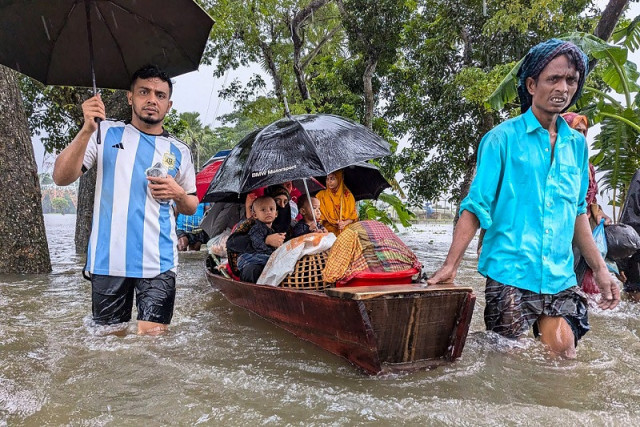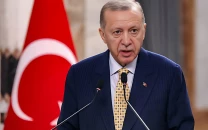Floods devastate Bangladesh amidst political transition
Torrential rains flood eight districts, stranding thousands; new interim government faces immediate challenge

Floods triggered by torrential rains have swamped a swath of low-lying Bangladesh, disaster officials said Thursday, adding to the new government's challenges after weeks of political turmoil.
At least five people have died and hundreds of thousands are stranded in the floods in at least eight districts in southern and eastern areas.
"Around 2.9 million people have been affected and more than 70,000 people have been taken to shelters," Mohammad Nazmul Abedin, senior official in the Ministry of Disaster Management and Relief, told AFP.
Long-time premier Sheikh Hasina quit as prime minister this month and fled to India after weeks of deadly student-led protests, ending her 15-year autocratic rule.
The South Asian nation of 170 million people, crisscrossed by hundreds of rivers, has seen frequent floods in recent decades.
It is among the countries most vulnerable to disasters and climate change, according to the Global Climate Risk Index.
Three of those who died drowned in floodwaters in the southeastern region of Cox's Bazar, chief administrative officer of Ramu district Rasedul Islam said.
The annual monsoon rains cause widespread destruction every year, but climate change is shifting weather patterns and increasing the number of extreme weather events.
The army and the navy have been deployed, with speedboats and helicopters rescuing those stranded by the swollen rivers.
Much of the country is made up of deltas where the Himalayan rivers the Ganges and the Brahmaputra wind towards the sea after coursing through India.
Neighbouring India's foreign ministry rejected accusations it was to blame for the floods, denying it had deliberately released water from an upstream dam.
It said the catchment area had experienced the "heaviest rains of this year over the last few days", and that the flow of water downstream was due to "automatic releases".
Asif Mahmud, a key leader of the student protests that ousted Hasina, and now the sports minister in the interim cabinet, had accused India of not only hosting Hasina, but of "creating a flood" by deliberately releasing water from dams.
India said that was "factually not correct".
"Floods on the common rivers between India and Bangladesh are a shared problem inflicting sufferings to people on both sides and requires close mutual cooperation towards resolving them," New Delhi's foreign ministry said in a statement.
Hasina's rule saw widespread human rights abuses, including the mass detention and extrajudicial killings of her political opponents.
But Indian Prime Minister Narendra Modi's Hindu-nationalist government preferred Hasina over her rivals from the Bangladesh Nationalist Party, which it saw as closer to conservative Islamist groups.
Modi has offered his support to the new Bangladeshi leader Nobel laureate Muhammad Yunus, who is heading the caretaker administration.
A United Nations team arrived in Dhaka on Thursday to assess whether to investigate alleged human rights violations committed during the protests, when more than 450 people were killed -- many by police fire.
The UN rights office had said in a preliminary report last week that there were "strong indications, warranting further independent investigation, that the security forces used unnecessary and disproportionate force" during the protests.




1725099588-0/BeFunky-(41)1725099588-0-208x130.webp)














COMMENTS
Comments are moderated and generally will be posted if they are on-topic and not abusive.
For more information, please see our Comments FAQ